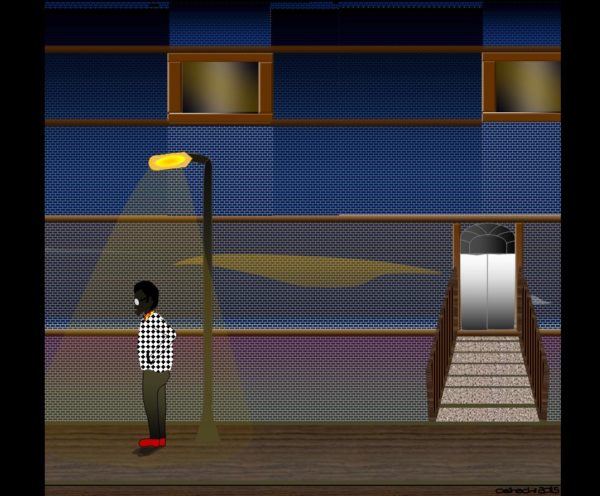
WHEN HE PASSED BY ME FOR the first time, I was on my second glass of Venus Portion, a cocktail made out of ginger beer, vodka, cherries, and something else. I swear I wasn’t drunk, I swear he looked at me or maybe inside my head I made him look at me with his brown eyes. It was Friday night and Machine Night Club was packed as usual, queer bodies on the dance floor dancing, basking in this freedom that is the light, that is our bodies knowing our history gives us this right to celebrate. Or maybe it was a lonely night and like me everyone wanted a night out. It didn’t matter if I had been discharged only a few days ago from the hospital, it didn’t matter if my body heavy with the effect of Lithium and Seroquel shouted for sleep, it didn’t matter if during one of my sessions with my therapist we had worked on my need to put my body through risk while running from pain. I knew why I was here, I wanted to get out of my house because everything within its walls spoke about death and I was scared of my aloneness, scared that my silence might be a man knocking on the door of a tomb. Besides, when have I ever been kind to my body?
The DJ kept spinning, I hummed to the songs I knew. We pick joy wherever we find it: it was a lesson I learned as a boy growing up in Benin City where dust rose from unpaved streets like moths finding light during December months, where I looked at the bodies of young boys like me after football matches and wish they were doors I could walk through. Once, in that city, I had written a love letter to a boy. He was in my class and had curly hair. I have forgotten his name—memory is never faithful—but sometimes I remember the shape of his face and the sound of my breath as he and his friends beat me up after school. He had stayed behind after his friends walked towards the football field; their white shirts became one with the sky as I prayed them away. In that moment I saw what came before death, blood flowed down my face, and suddenly, he kissed my bloody lips.
I was confused.
I didn’t look at his face, I looked instead at the green color of the bushes, surprised they still had life in them during this dry month. I looked at the fallen walls of buildings that used to be classrooms, the heap of dirt by the side of closed stores painted white. Perhaps I was taking in my surrounding, making that moment into something real. That kiss was never romantic for me, I didn’t write it down as the first time I kissed a boy. It was, to me, a tender moment that comes after a war, a moment that reminded me that I was still human. But it confused me. Often, I would wonder how tenderness and violence could come from one body, come from that kiss, that moment.
When I got home, I lied to my mother about the bruises on my body. But it was that beating that taught me to stay in the dark and watch the world from a window, gauging how to engage and navigate a city that sought to kill my body.
As a boy growing up in a place where heteronormativity was the norm, I had no words for what I was. It would be years later before I knew the words gay and bisexual. Back then, all I knew was desire, and I knew how powerful it was, that on some days I woke up from dreams filled with boys to find semen stains on my briefs, and I knew what name lived in my silence. As I grew older, I saw how the world reacted to boys like me.
Once, a man came from Germany to the church my mother attended; his mother had begged him to come back to Nigeria after his wife called her on the phone, tears making her words nearly undecipherable, to say that she caught him in bed with a man. In church, the women looked at him and asked themselves how a handsome man could prefer another man over the body of his wife. I watched them touch their hips, their hands, as if to remind themselves that they were still attractive to men. When it was time for prayers, the Prophet called the women to pray for him. He knelt on the ground, the smell of incense was heavy in the air, and a picture of a half-naked Christ leaned against the wooden cross. The women prayed for his body to be free, and as they prayed and cries of Jesu! and Mimo! reached for the roof, they brought out canes made out of raffia palm and began to beat him, their suntanas making them look like angry angels.
It was our church’s belief that every demon that hurt a body must be hurt in order for it to leave that body, and that the body must be willing to live through it, so the man didn’t cry. As the beating increased, he fell to the ground and remained there, until the Prophet told them to stop. When he rose, he went to the pulpit and gave a testimony. I didn’t hear what he was saying, all I did was look at my mother, and the joy in her eyes told me she would gladly submit my body to pain because a god with blue eyes called it sin.
I LEFT THE CHURCH AS AN adult and found peace in Yoruba Spirituality. But even there my body was not safe: queer people are called woods for sacrifice and I insisted on fashioning a place for myself out of the faith of my land. For years I called myself a child of Olokun, an Orisa who dwells in the sea, who is known to be female in Yoruba Spirituality and male in Benin Traditional Religion. When Ifa confirmed that I was indeed a Child of the Sea, I was glad. What fits a child born out of two tribes that call Olokun a deity of the sea, a child that loves men and women and people without gender, a child that seeks home in strange places, than an Orisa that called the sea home, the ruler of a place without gender.
I WAS LOOKING AT THE BOY with brown eyes and music. I watched him around the dance hall: he was beautiful. My eyes fell also on some other men, whose shirtless bodies or the way they moved I admired, but they were not like him. There was something about him that called me the way a river calls a thirsty animal. When he passed by me for what seemed like the fifth time, I touched his fingers and asked if he wanted to sit down. He sat on the empty bar stool by my side. He was so beautiful up close, I felt like falling asleep in his eyes. He took a sip out of his glass and said, “Back home I’ve never been to a party with so many white people.”
“What do you mean?” I asked.
“You know, you know what I’m talking about,” he said as he took another sip from his glass and then drank everything in it. I watched him. I had known he was African when he walked in, his clothes were too bright, too beautiful in certain ways that shouted he was not from here. When he spoke to me it was as if he was singing. It is the African way: we learn language from the stories of our grandmothers, at their feet we learn how language could sing even when we are not singing, that even when speaking the language of the colonizers we could make it ours, that we made it sing, that in protest we welded it to our land and fashioned a deeper language that sang about us, from the streets of Warri to Accra to every Afrobeats song. I have heard it also in every Chale or How far? that was ever spoken to me. It has given me joy to know that language can resist, that those who can still fight were never conquered, and here we are with a language that sings, two men from Africa.
The barman asked if he wanted another drink and he nodded, and within minutes a glass was placed beside him. “What are you drinking?” I asked.
“I don’t know, I told the barman to surprise me with a cocktail.”
The dance hall was still alive, it was 1 a.m., we had one more hour; night clubs in Boston closed by 2 a.m. and there’s also no happy hour in this city. I missed late nights at Mokola Roundabout and the strip clubs in Ikeja where we could party till 4 a.m., but then we made do with what we had. That, my mother once said, was how we learned to survive. We must celebrate what doesn’t kill us. I count my losses by how many times I’ve partied till dawn. I am my mother’s child.
THE CAMBRIDGE NIGHT was getting colder. The man kept looking at me. I wondered what he wanted. I also wondered if he came alone, if he was waiting for someone because he kept looking towards the door. I didn’t go to the club to get entangled in some love triangle or to woo a man for hours; I came to get drunk and take a man home—it was that simple. “What are you thinking of?” he asked.
“Nothing.”
“You sure?”
“Yes, you should not worry about me.”
“Okay. When did you arrive the States?”
“July.”
“And you are already in a gay club!”
I laughed.
“It took me almost two years to enter one. How did you find your way?”
“Yelp,” I said.
“Good old Yelp.” He laughed.
I had lied to him, I couldn’t explain why I lied. I knew, when he said it took him two years to party in a gay club, that there was something left unspoken. I knew it by the tone of his voice; we were shouting, trying to be heard above the music, but his voice went low when he talked about the club, and something in me was no longer interested in hearing more. The truth was that I heard about Machine Club from John, a fifty-year-old white man I met at Harvard’s Lamont Library during the “Passport in Transit” colloquium. He had walked up to me after the event to introduce himself, to invite me to go camping with a group of gay men at the end of summer. While talking he told me the queer history of Massachusetts, how they fought to be seen. He thought it was brave of me to speak up as a bisexual Nigerian. When I told him that it was my first time saying those words in a room full of people, “bisexual Nigerian,” that when I said them it felt like my tongue was saying freedom, he recommended that I visit the club to celebrate.
I have always identified as “queer.” While it is an encompassing word for everyone not heterosexual, it is also a word most people in Nigeria don’t connect to “homosexuality.” But what I am must be very clear in my home, because I have suffered to be this free, because I love men and women, because I am shameless about this body of mine. Once, I thought I was gay, but I had come into my place on this earth as a bisexual man, and in this room, it felt like the world was seeing me for the first time, and it felt good.
“Do you want to dance?” he asked.
“Sure.”
What I really wanted was to go home, but I couldn’t say no to dancing. He led the way and I followed him. The DJ was playing a slow song. We danced without our bodies touching. Then I placed a hand on his shoulder, and another on his back. He did the same and we danced, awkward at first, like a river finding its path, and then it got to us, the music, and we began wilding.
This must be what grace means: a body free, a body not weighed down with prayers of survival or gratitude. The DJ announced the last call and I asked him if wanted a drink, if I should request instead for an Uber. When I repeated home and Uber in the same sentence, he nodded. I was scared of asking him to follow me home, but I wanted him, I wanted anyone that night. I was scared and thought a body would save me. Within minutes we were grabbing our coats and heading outside to meet our Uber Driver. I held his hand as we drove to my dorm.
DUNSTER HOUSE IS LOCATED ALONG Memorial Drive, opposite the Charles River that divides Cambridge and Boston. It is part of the Undergraduate Housing and I was grateful to be spending my fellowship year there as a resident scholar. When we got home, he kept asking if I lived there or was just visiting. When I said I lived there, he said he used to sneak in some months back, just before it was renovated. I smiled and said, “Today, you don’t have to sneak in.”
We started kissing as soon as we entered my apartment, our lips finding each other’s, two men obeying desire. My hand grabbed the back of his hand, and as my other hand fumbled with his belt, I felt his erect penis and all I could think about was touching it, was feeling its warmth in my mouth. Because I didn’t know his name, the moans that came out of my mouth were pure. My hands roamed all over his body as I calculated the distance between the lube and condoms in my room and the door of my living room. All I wanted was to fuck this man, to hear him reach climax.
I was still in my head when it happened. At first, I thought it was just an expression of desire, then they became heavier. The blows landed again and again on my ribs. He kept asking for my name as if he was drowning and my name was a lifeboat, as if I was the miracle to his prayers. I stayed there as the blows landed until I couldn’t bear it anymore. I pulled away and went to the bathroom to urinate. When I came out, I lit a cigarette and sat down beside my bookshelf. I watched him cry, his head in his hands, his shoulders moving up and down. What was he crying for? I remembered the first time I kissed a boy, how I felt ashamed as if what I was doing was unnatural, how at the same time my body wished for more.
I could still feel the pains from his blows, I knew by morning it would be worse. I wanted to reach out to him, to tell him it is okay, but all I could think about was a dead deer. It was a strange thought because I had seen other deaths that shook me to the core: I had watched my mother cry to death in an understaffed government hospital with an empty pharmacy in Benin City; I had known a dead brother without a name; I had been haunted by this dead baby in my dead mother’s body, haunted by this absence of naming; but here, all I could think about was a dead deer we’d found on my grandmother’s farm as kids. The bullet had entered its soft skin and its life blood was still wet on a burnt farm prepared for planting yam and melon. There was something ritualistic about blood and ash and sand; maybe that’s why I thought about the dead deer; I thought both of us were trapped inside the dead body of a deer, struggling for light, struggling to breathe inside a dead animal.
He was still crying.
I asked if he needed an Uber and he said he preferred to walk home. I said nothing as I sucked on my cigarette, allowing the smoke to linger in my throat before blowing it out, then I stood up and opened my door. After a while he walked out. I didn’t call him back, even though everything in me wanted to tell him to come back and stay the night on my couch. Something about him reminded me of the first time I had sex, how the woman held my head to her breasts after I came and said, “Rest.” I had since spent my life wondering if she saw my past or my future, if she saw the years I would spend living in brothels, getting wasted while holding on to life in any way possible.
I watched him through the window as he walked into the cold, I watched him until he was no longer visible, then I went into the bathroom to turn on the shower. I felt dirty. It felt as if death lived in my body, as if something rotten was threatening to come out of me to remind me that my body was still considered sin even by people I love. Under the shower, I sat down as hot water hit my skin. I closed my eyes as the pain became too much.
Perhaps this is my way of praying, of saying I am here, of saying I survived the fire but the scars are still on my skin, and as I opened my eyes I thought I was a deer running into the light, running from every pain, saving every boy heavy with trauma, with shame, with everything that holds back a body from being whole, and in my silence I uttered a prayer.
As I came out of the bathroom, I knew that what lived in my darkness was behind me, that tonight I am free, I am alive. I went to bed and waited for the darkness to join me, including the new one that came with blows.
About the Writer:
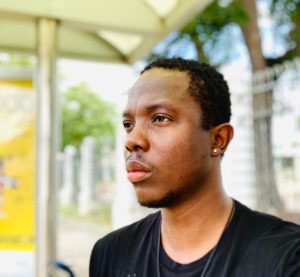 Romeo Oriogun is the author of The Origin of Butterflies, selected by Kwame Dawes for the APBF New-Generation African Poets Chapbook Series. His poems have appeared in Prairie Schooner, Connotation Press, and Brittle Paper. He was the 2017 winner of the Brunel International African Poetry Prize, a fellow of the Ebedi International Writers Residency, and is currently a Visiting Poet at Harvard University.
Romeo Oriogun is the author of The Origin of Butterflies, selected by Kwame Dawes for the APBF New-Generation African Poets Chapbook Series. His poems have appeared in Prairie Schooner, Connotation Press, and Brittle Paper. He was the 2017 winner of the Brunel International African Poetry Prize, a fellow of the Ebedi International Writers Residency, and is currently a Visiting Poet at Harvard University.


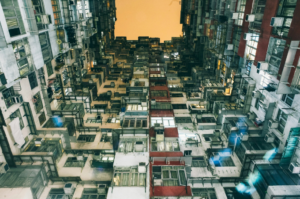
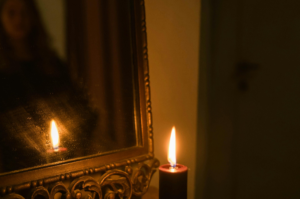
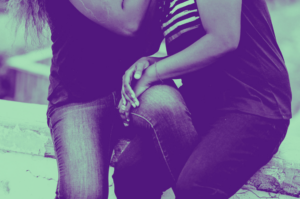

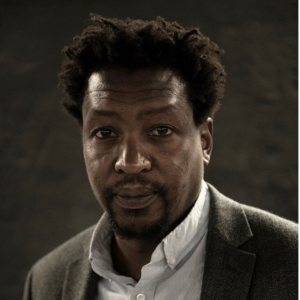


COMMENTS -
Reader Interactions